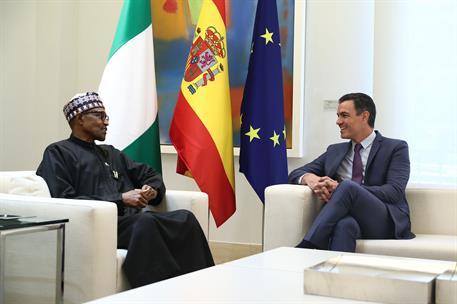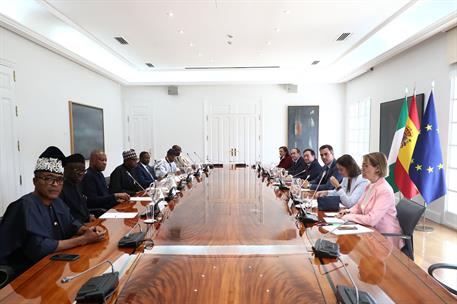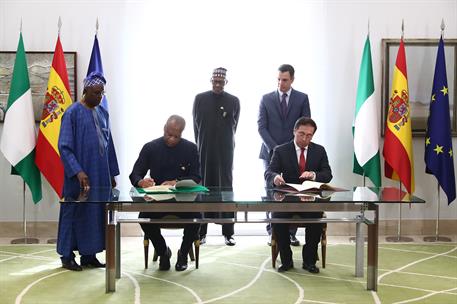Spain and Nigeria share their concern over the serious threat to global food security caused by Russia's aggression against Ukraine
President's News - 2022.6.1
The President of the Government, Pedro Sánchez, received the President of the Federal Republic of Nigeria, Muhammadu Buhari, at Moncloa Palace | Video: Pool Moncloa/Jorge Villar - 2022.6.1
Moncloa Palace, Madrid
The visit is part of our country's renewed interest in sub-Saharan Africa as an essential element of Spain's foreign action, as indicated by the III Africa Plan, the Horizontal Strategy Africa 2020 and the Africa 2023 Focus, promoted by Government of Spain.
During the meeting, the two leaders confirmed their shared view and understanding of the current international situation, in addition to reaffirming the two nations' mutual strategic interests, reflected in the Joint Declaration adopted by Spain and Nigeria whereby the two countries have decided to deepen their already excellent bilateral relations and cooperation.
In the Joint Declaration, they "deplore the aggression perpetrated by Russia against Ukraine" and express their "deep concern" about the severe humanitarian crisis resulting from the war, as well as the consequences for food security in many regions of the world, and particularly sub-Saharan Africa.
They also reaffirmed their defence of multilateralism and respect for the principles and Charter of the United Nations. They further renewed their commitment to achieving the Sustainable Development Goals and the 2030 Agenda, and to universal access to the COVID-19 vaccine. In this regard, President Buhari thanked Spain for its "important contribution" to Nigeria, with more than 4,400,000 doses - the largest donation ever made by Spain to an African country - through the COVAX mechanism.
Energy
In the field of economics and trade, a Memorandum of Understanding (MoU) has been signed to "promote, support and facilitate" cooperation in the following areas: agriculture and agro-technologies, renewable energies, environmental and clean technologies, advanced manufacturing and industry 4.0, sustainable tourism, digital economy and innovation. In all of them, the relevance of private investments in contributing to job creation and sustainable and inclusive technological development is recognised.
Likewise, the two countries have confirmed their willingness to strengthen energy supplies at a time of particular international pressure on energy markets due to the current context of war.
In the Declaration, Spain has recognised Nigeria as one of its main "and most reliable" gas and oil suppliers, and Spain as Nigeria's second largest customer. President Pedro Sánchez has conveyed to President Buhari "the interest of Spanish companies" in the sector in "continuing their commitment to Nigeria to seek agreements that ensure a stable supply on a lasting basis", also extending this strategic relationship to the development of sustainable energy, in accordance with the 2030 Agenda for Sustainable Development.
Security and migration
In the areas of migration and security cooperation, Spain recognises Nigeria as a key player in the current challenges to peace, stability and security in sub-Saharan Africa. Due to its size, economic weight, defence of democratic values and regional and global prominence, Nigeria is classified as an 'anchor country' in the Third Africa Plan promoted by the Government of Spain, playing a fundamental role in finding solutions to terrorism - especially in the Sahel region - migrant trafficking networks, and maritime piracy in the Gulf of Guinea.
Sánchez and Buhari recalled that Spain and Nigeria support the objectives of the Global Compact for Safe, Orderly and Regular Migration. To this effect, the two welcomed the fact that "the all-encompassing approach" of the Pact is reflected in the five pillars that make up the 'Team Europe Initiative' on Migration on the Atlantic/Western Mediterranean Route, proposed by Spain and presented in Nigeria.
In the area of judicial cooperation, three international agreements have been signed on extradition, mutual legal assistance in criminal matters and the transfer of sentenced persons.
Last, in the areas of scientific research and innovation, health, sport and tourism, MoUs have been adopted for health cooperation, the priority promotion of science, the interest in increasing cooperation and the presence of the Spanish language in educational centres in Nigeria, the promotion of new tourist routes (including sustainable tourism), and the exchange of experiences and knowledge in the field of sport.
Non official translation







